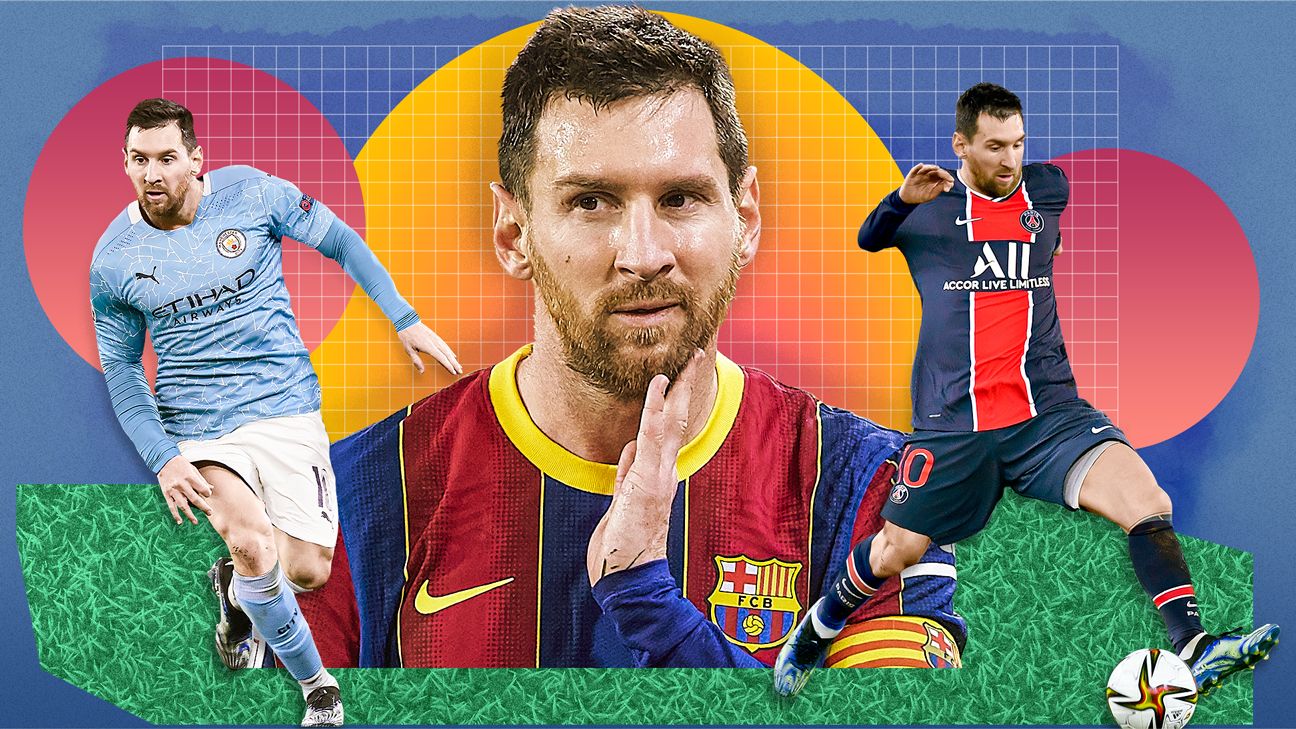Lionel Messi needs little introduction: he’ll go down in history as one of the best to ever play soccer, with six Ballons d’Ors to his name, countless individual awards and team trophies in his cabinet and all of them earned while playing for Barcelona. And yet, this summer he has a very real choice. After trying to leave Barca last summer — remember we all learned the word burofax? — he’ll be able to walk out the door for free this summer once his contract expires on June 30.
– Stream ESPN FC Daily on ESPN+ (U.S. only)
– ESPN+ viewers guide: Bundesliga, Serie A, MLS, FA Cup and more
What will he do? He’s got three realistic options in front of him: join former boss Pep Guardiola at all-conquering Manchester City, reunite with former teammate Neymar at Paris Saint-Germain, or succumb to the sentimental and sign a new deal at Barcelona. More importantly, what about the clubs themselves? ESPN’s Mark Ogden (Man City), Julien Laurens (PSG) and Graham Hunter (Barcelona) unpack the pros and cons for the three teams vying for Messi’s signature this summer.
How smoothly would he fit? What would have to change around him? How will the financial aspect work given the cost-cutting needs of the coronavirus pandemic?
Jump to: Manchester City | PSG | Barcelona

MANCHESTER CITY
The case for: Manchester City are still on course for a domestic treble and could also win the Champions League this season, so adding (arguably) the best player in the world to one of the strongest squads on the planet, under one of the best managers, Pep Guardiola, would be an emphatic statement of the club’s determination to remain at the top of the game.
Messi would bring goals, creativity and star quality, and his presence in and around the team would surely only help accelerate the progress of City’s Phil Foden, the 20-year-old midfielder who is regarded as the best English player of his generation.
– Sources: Man City have not yet opened Messi talks
The football logic of signing Messi is clear. Despite his age (he will be 34 in June), he will only make City more formidable. But it is off the pitch that Messi could do most for City. Ever since the Abu Dhabi takeover in 2008, City have wanted a megastar signing, but moves for Kaka, Wayne Rooney, Neymar and Kylian Mbappe all failed to come off. From a commercial and branding perspective, City need Messi to help close the gap on traditional superteams such as Liverpool, Manchester United, Real Madrid, Barcelona and Bayern Munich, whose respective histories and illustrious former players give them an edge on a club that still falls short in terms of global appeal.
Signing Messi would further increase City’s profile and make them more attractive to sponsors, who would happily pump money into the club to be associated with the Messi brand. Even if Messi failed to deliver on the pitch, City know he would transform their brand off it and that’s why they are so keen to sign him.
The case against: From a football perspective, there’s a point to be made that City don’t need Messi. Indeed, signing him could actually disrupt the team Guardiola has built. City have done pretty well without Messi in recent seasons, and the suggestion that signing him would unlock the door to winning the Champions League doesn’t stack up when you consider that Barcelona haven’t won it since 2015, despite having Messi in his prime in their lineup for each of the past six years.
If Messi moves to the Etihad, so many players would have to sacrifice themselves to accommodate him in the team. Is it really worth the risk of disrupting Kevin De Bruyne, Raheem Sterling, Bernardo Silva and Phil Foden, and diminishing their status in the team, simply to put a 34-year-old vanity signing in the side?
Messi is still an exceptional player, but his performances and goals/assists over the past 12 to 18 months point to a decline in his output, and one thing that has defined City’s recruitment over the past decade is their refusal to lavish big money on players who are past their peak. Instead, City have identified young, emerging talent and invested in their future. Sergio Aguero, David Silva, Sterling, De Bruyne and Ederson all fit that profile, and they have been hugely successful.
Rather than commit as much as £100m a year on Messi’s salary, surely City would be better served by following their own blueprint by signing Erling Haaland or trying again for Mbappe. They would give more long-term value than Messi, though Messi might be the statement signing that City just cannot let go.
What should Man City do? If City sign Messi, it will be because the commercial benefits are irresistible to the club’s owners. Yes, he can still have an impact on the pitch, but City don’t need Messi to win trophies. They want to be seen as the No. 1 destination for the world’s top players and having Messi on board would encourage others to follow in the future.
Despite the costs involved, City would get a short-term kick on the pitch and a long-term boost off it. On that basis, it would be a win-win for City to sign Messi. — Mark Ogden
0:37
Bayer Leverkusen’s Leon Bailey explains why he believes Lionel Messi should leave Barcelona.

PARIS SAINT-GERMAIN
The case for: Since the Qataris bought PSG in the summer of 2011, they had one dream — bring either Lionel Messi or Cristiano Ronaldo to the Parc des Princes. They tried many times, especially with the Portuguese superstar, and they always failed. Now that there’s a chance to get the GOAT from Argentina, they won’t give up.
PSG say it would obviously give them an even bigger chance to finally win the Champions League, the one prize they’ve craved for almost a decade. Even if Messi is turning 34 in June and has not won the biggest club competition since 2015, he would make PSG a better team and a bigger contender. Messi can win games on his own, whatever the opposition or the level. And if you have Neymar, Kylian Mbappe, Marquinhos or Marco Verratti around him, you could build something long lasting.
More than on-field performance, signing Messi would give PSG and their owners a credibility they’ve craved every bit as much as that elusive trophy. For critics who don’t really take the Parisians seriously, Messi would offer some validation to their project.
Regarding the PSG brand, it’s growing day by day and the Messi factor would propel it so much further, and so much faster. Marketing-wise, it would be the coup of the century — far bigger than attracting Zlatan Ibrahimovic, David Beckham or Neymar in the past.
Finally, in the constant rivalry between Doha and Abu Dhabi, having Messi choosing Paris over Manchester City would be a sweet feeling. They have at times fought for the same players in the past, but winning the battle for Messi would be something else, even at their level.
The case against: Messi will be 34 in June and you can argue that, even if Mbappe ends up leaving, the Argentine genius is not really what PSG need. They could use the summer (with or without the revenue generated by Mbappe leaving) to make their squad more balanced around Neymar.
At his age, Messi would cost a lot of money in wages, signing-on fees and other bonuses. In the current context, the club would have to make a really significant effort to put this money on the table, money that they don’t really have considering they’re projecting losses of around 200m euros this year. PSG have been hit hard by the coronavirus pandemic, maybe even more than other big European clubs, given that the 2019-20 Ligue 1 season was halted during the pandemic and didn’t resume.
If Messi arrives, how can PSG possibly retain Mbappe? Replacing the French star with Messi, essentially using the money from selling the Paris-born prodigy to fund the biggest transfer of the club’s history, is risky. Furthermore, any deal with Messi would be strictly short term. At his age, and the things he’d hope to achieve before retiring — perhaps a stint in MLS or back at his first club, Newell’s Old Boys — there would not be much time for him in Paris. Maybe two years at most? Just one? Would it really be worth it?
What should PSG do? PSG are waiting for Messi to make a decision. Right now, the priority is to keep Neymar and Mbappe, extending their current deals — which expire in June 2022 — while preparing a plan to be able to welcome Messi. Financially, it would be a nightmare, but they say it is possible. They will try everything they can to court the Barca No. 10, and Neymar is already lobbying Messi with the aim of recruiting him. Neymar’s pitch is easy: Come and play with me again and let’s win the Champions League together. PSG are all for it. — Julien Laurens

BARCELONA
The case for keeping him: There was a point, beginning last August, that the prospect of Messi staying at Barcelona — and it being a sound decision for any of the parties involved — would have seemed ludicrous.
Not so in 2021. The vast majority of Messi’s anger was directed at a now-departed club president who he says repeatedly misled and betrayed him. Josep Maria Bartomeu is history and, with something close to certainty, the Big Boss going forward from the March 7 presidential elections will be Joan Laporta, someone with whom Messi, and the family members who represent him, have always had friendly relations.
The other part of Messi’s (understandable) fury was that the twilight years of his sublime career were being besmirched by FC Barcelona’s moribund — you’d almost say self-destructive — approach to squad renewal and the building of an ultra-competitive XI. Again, things have rebooted on that front too. This season, Barca are distinct from the desperate months under Quique Setien & Co. that threatened to tear the club apart. They’re incomplete and occasionally vulnerable, true, but hugely improved in playing style, flair and competitive ability, and they boast the threat of much more to come.
But to continue this line of argument any further without mentioning Pedri — born Pedro Gonzalez Lopez — would be a huge error.
The 18-year-old is utterly exceptional — he’s the best Under-20 footballer anywhere in the world (including Ansu Fati) by miles. If you’ve not had the benefit of watching Pedri and Messi frolicking around Spanish pitches together, then don’t simply take my word for it. Seek them out.
Messi adores the kid from the Canary Islands. It should be the other way round, but Barcelona’s No. 10 acts as if he’s suddenly got another son. Instinctively, they think identically about football — about seven or eight beats ahead of almost everyone else in their team or in the opposition. It’s a little bit like what we were all deprived of when the Ronaldinho-Messi symbiosis of 2005-06 was cruelly curtailed — first by the Brazilian’s fondness for nightlife and then by Guardiola’s “clear the decks” arrival.
Suddenly, Pedri — and to some extent Antoine Griezmann, Ousmane Dembele, Ronald Araujo, Francisco Trincao and Frenkie de Jong — have all changed Messi’s understanding of what might be achieved with this squad if there are one or two well-judged additions, even amid the club’s horrible financial crisis. No informed opinion on Messi’s future can ignore the fact that to some teammates, he’s an intimidating and sometimes off-putting figure around the training ground. But if he’s renewed in his commitment to the club, if he’s energised and if he’s desperate to win important trophies, there’s no question that, even if less regularly than in his peerless era, Messi can still put in performances that not only make him look like the best, most exciting player in the world — he can also make Barcelona irresistible again.
The case for letting him go: It’s the economy, stupid. You can concoct arguments about how another two or three years of Messi in blaugrana might negatively affect change, renovation and development at Camp Nou in pure football terms, but that would be irresponsible. There’s only one elephant in this room, and it’s the colour of money.
1:58
Craig Burley says the grass may not be greener at another club should Lionel Messi leave Barca this summer.
FC Barcelona’s financial figures are complex, and some parts are open to a variety of interpretation, but nobody can evade three key facts: Their €1.1bn global debt is a horrific figure to deal with, the revenue stream is and will continue to be brutally affected by the pandemic and, finally, the outlay needed to retain Messi via anything even vaguely similar to his current deal is unfeasibly huge. The club still owes him a vast sum — perhaps as much as €60m — and the couple of hundred million it would take to reengage him when he’s out of contract in June, hypothetically for another two seasons, is money that FC Barcelona neither have nor can faithfully promise to have.
But, for the sake of argument, let’s say that President Laporta (hypothetically) promises to name Barcelona’s Camp Nou stadium “El Estadio Messi” in perpetuity, guarantees Messi that he’ll be head of the club’s La Masia Academy the instant he finishes his playing career at Inter Miami or with Newell’s Old Boys, and agrees to a reduced, reasonable salary that Barcelona can actually afford from 2021 until 2023 — and the wee man agrees to stay on those terms — there would still be negatives.
Barcelona’s squad is improved, but that’s because coach Ronald Koeman has been daring in how much he has used, trusted and, crucially, developed previously unused academy kids; he has also benefitted from breakthrough seasons by Dembele, Trincao and Pedri. This isn’t to say that this squad, if it wishes to win La Liga and be a Champions League contender, doesn’t need astute refurbishing. But that requires money the club will struggle to raise and money that, in this scenario, will be paid to Messi.
It’s an invidious situation and one in which — it’s perfectly feasible — Messi’s family love of this city, his loyalty to the club (rather than the previous board), his unwillingness to uproot in the middle of a pandemic, his lack of appetite for a change of climate, culture and language might leave Messi willing to stay, to commit, to renew, to apply his greatness … but leave Barcelona unable to fund that wish.
What should Barcelona do? With both sides of the case made, here’s the endgame: If I were Laporta, I’d mix elegance with street smarts. Messi was understandably sick of being fed nonsense by the previous board, who patently thought of him as someone to be patted on the head, misled and then discarded. Be straight with him and his people. Show them the books. Explain that you want him, passionately, to stay and retire at FC Barcelona. Engage in finding mutually interesting ways of constructing a two- or three-year deal that attacks the financial problem laterally — meanwhile, accepting, openly, that it’s Messi’s duty to investigate the PSG and Man City options. Encourage him, even.
In 2003, Barcelona were working hard on the Ronaldinho deal with PSG. They were in the race but losing, all the while insisting to the Brazilian that after some grey-wintered “Northern” seasons in the French capital, he’d hate the rain, cold, damp and grey skies of Manchester. Ultimately, when Manchester United and PSG fell out over Ronaldinho’s price, the player factored the weather and culture into his decision and chose the Mediterranean life.
Laporta would be wise to revisit that tactic. Perhaps Messi is ready for a change. Perhaps he can be tempted to put aside worries about whether his wife and kids (a factor that’s absolutely fundamental to him) can adapt and settle, whether he can work, thrive and excel in a French or English training ground. Perhaps. But, were I Laporta, I’d play on this element, while admitting that it’s Messi’s right to play the field before deciding.
Among the many things I’ve learned about this phenomenal footballer, who will go down in the all-time pantheon of sporting (not just footballing) greats, is the truth that he requires to be happy, focussed, engaged and energised by his daily work, the likelihood of winning important trophies, and having people around him who aren’t subservient, but are leaders, winners and on his wavelength. If Laporta can convince Messi that this is the atmosphere he’d be staying to enjoy, and that he’s far less likely to encounter these things under the grey, freezing skies “up north,” then perhaps the Camp Nou faithful can continue to enjoy the greatest footballer they’ve ever seen.
What’s crucial to understand, however, is that, for any of these three clubs, it’s not about winning the battle to obtain Messi’s services — it’s about the longer war to make him inspired, engaged, ambitious, hungry and supreme again, even at the age of 34. It can be done.
Manchester City, PSG, Barcelona: start your engines. — Graham Hunter
